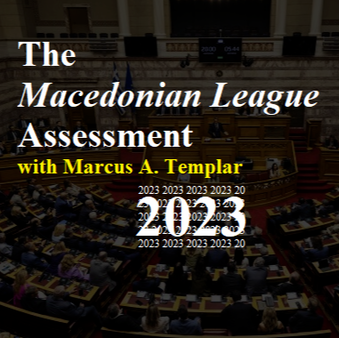
In the 2023 Macedonian League Annual Assessment, we talk with National Security Advisor, Marcus A. Templar, for an in-depth analysis of some of the most pressing questions from our audience, including among others: Ouranio Tokso's Centre for Macedonian Language, Skopje, Albania, the Greek minority in Albania, Turkey, Bulgaria and Greek politics.
Question:
What does it say about the Greek political system that allowed for the creation of a "Centre for the Macedonian Language" by well-known Ouranio Tokso separatist agitators?
What does it say about the Greek political system that allowed for the creation of a "Centre for the Macedonian Language" by well-known Ouranio Tokso separatist agitators?
Unfortunately, Article 15.4 of the 2018 Prespa Agreement allows such cultural centers. It states that the parties "shall place special emphasis on the development of cultural relations between the two States, their societies, and their social groups, having particular regard to arts, dance, cinematography, music, and theatre."
I would not have any problem with the above text and its implementation if I knew that it is in practice, reciprocal, and in good faith. I do not see it happening. It is basically unfair because the Greek minority in the republic of Skopje is effectively nonexistent.
I would not have any problem with the above text and its implementation if I knew that it is in practice, reciprocal, and in good faith. I do not see it happening. It is basically unfair because the Greek minority in the republic of Skopje is effectively nonexistent.
Question:
In continuation to the previous point, why did the Greek government not foresee that the Centre for the Macedonian Language is not just a typical "language center" but also attempts to act like a "lobby" organization? For example, one of their main pillars is the "re-Macedonization" of Greek city and town names in Macedonia. Another pillar of the center is keeping a list of "anti-Macedonian" incidents in Greece.
I say this: Either the EYP (Greece's intelligence agency) exists only on paper, or its members are untrained, or their little training is for the birds. Of course, it can be that politicians do not read, or disregard reports issued by EYP's analysts, basing their decisions in accordance with those of the foreign policy think tank ELIAMEP. If I had to decide between those two, I would choose the EYP, but the people of Greece are responsible for the politicians they choose, not I. Of course, it depends on the meaning of "Macedonization." Macedonia is already Macedonized, i.e., Greek. It goes back to ancient times. Strabo states (Book 7. 9. 1), "Macedonia, of course, is a part of Greece." I was born in Thessaloniki and studied in Central Macedonia. I know Macedonia, and it was and is Greek.
Question:
How do you feel about Albanian claims over Greek territories?
Athenians rule Greece since 1830. My question is simple: would they negotiate their own personal property in a way that would seriously hurt their pockets, like they have negotiated the issue of Macedonia and are negotiating issues of "autonomous" Northern Epirus and the Aegean islands? I greatly doubt it.
I saw them backing down after a domestic court in Albania, with NO jurisdiction over International Law and the Law of the Sea, decided against the EEZ agreement between Albania and Greece.
I have no idea what happened to Socratic utterance about one's homeland:
«Μητρὸς τε καὶ πατρὸς καὶ τῶν ἄλλων προγόνων ἁπάντων τιμιώτερον ἐστὶ ἡ Πατρὶς καὶ σεμνότερον καὶ Ἁγιότερον ἐν μείζονι μοῖρᾳ καὶ παρὰ Θεοῖς καὶ παρ' ἀνθρώποις, τοῖς νοῦν ἔχουσιν».
Here is the whole text in English:
I saw them backing down after a domestic court in Albania, with NO jurisdiction over International Law and the Law of the Sea, decided against the EEZ agreement between Albania and Greece.
I have no idea what happened to Socratic utterance about one's homeland:
«Μητρὸς τε καὶ πατρὸς καὶ τῶν ἄλλων προγόνων ἁπάντων τιμιώτερον ἐστὶ ἡ Πατρὶς καὶ σεμνότερον καὶ Ἁγιότερον ἐν μείζονι μοῖρᾳ καὶ παρὰ Θεοῖς καὶ παρ' ἀνθρώποις, τοῖς νοῦν ἔχουσιν».
Here is the whole text in English:
your country is more precious and more to be revered and is holier and in higher esteem among the gods and among men of understanding than your mother and your father and all your ancestors, and that you ought to show to her more reverence and obedience and humility when she is angry than to your father, and ought either to convince her by persuasion or to do whatever she commands, and to suffer, if she commands you to suffer, in silence, and if she orders you to be scourged or imprisoned or if she leads you to war to be wounded or slain, her will is to be done, and this is right, and you must not give way or draw back or leave your post, but in war and in court and everywhere, you must do whatever the state, your country, commands, or must show her by persuasion what is really right, but that it is impious to use violence against either your father or your mother, and much more impious to use it against your country?" What shall we reply to this, Crito, that the laws speak the truth or not? (Plato, Crito, 51.a-c)[1]
The sad part is that modern high school students and even some teachers do not know about this. I had experience in a Greek school in a northern suburb of Chicago a few years ago. Even the teacher who boasted to me that she had graduated from the Kapodistrian University of Athens was as irrelevant to this as her students. Yes, indeed! The class, including the supposedly Greek teacher, was ignorant of what was behind the Macedonian issue, but they were the first to opine.
Countries do not fall from outside dangers but from domestic corrosion. I just finished translating from Romanian to English an academic paper. During my research, I could not help but remember the roots of the demise and the gradual development that ended the existence of the Roman Empire.
Athenians are apathetic, hiding behind a pseudo-sophistication; not only do they not know the neighbors of Greece, but they do not even know Greece. Greece is much more than Attica, the Peloponnese, or even Crete.
As a Greek soldier, I proudly served as a simple private in Polykastron, Macedonia, for 24 months. While I was a student in Montreal, I volunteered to return to Greece and fight against the Turks in 1974; I can prove it; I still have the receipt from Council General of Greece in Montreal. That is patriotism. Waving the flag and making speeches boasting about yourself is garbage.
Blood does not make anyone Greek; the heart does.
Question:
In recent years, the Turkish government has been promoting the odd position that Greece is responsible and should be made to pay reparations for the Tripolitsa Massacre of 1821. The Turkish MFA publicly commemorates that day as a "genocide" and the conservative Islamist Yeni Shafak newspaper recently stated that Greece should be taken to an international court. However, there are two main problems - one, that there was no Greek government in 1821, and two, that the Ottoman Empire was an imperialist power that colonized foreign lands. Why does the Turkish government put forth such preposterous positions? Do they do it just for kicks?
Before I start, I would like to explain the meaning of the newspaper's title. It is Yeni Şafak (Yeni Shafak) and means New Dawn. The paper has been accused of using hate speech to attack minorities and opposition as reported in 2014 by the BBC, AI Monitor and Hrant Dink Foundation.
Evidently, the author of such a "legal" opinion is unaware of what constitutes "genocide." Probably, he tried to please his boss, Erdoğan, from the former Greek village of the Pontic "Potamya." The Siege of Tripolitsa (Greek: Ἅλωσις τῆς Τριπολιτσάς]), also known in Turkish as "Tripoliçe katliamı" occurred in the spring and summer of 1821 during the early days of the Greek War of Independence against the Ottoman Empire, which had started earlier that year, which resulted in an early triumph for the revolutionary Greek forces.
Tripolitsa was a crucial target since it served as the Ottoman Empire's administrative hub in the Peloponnese. Once Greek revolutionary forces took it over, they massacred the Turkish inhabitants of the city. The frustration of the Greek fighters was so high after 400 years of boorish enslavement that nothing and nobody could stop them. But let us see some massacres committed by the Ottoman Turks.
The following is a partial list of Turkish massacres from 1822 up until 1909:
Evidently, the author of such a "legal" opinion is unaware of what constitutes "genocide." Probably, he tried to please his boss, Erdoğan, from the former Greek village of the Pontic "Potamya." The Siege of Tripolitsa (Greek: Ἅλωσις τῆς Τριπολιτσάς]), also known in Turkish as "Tripoliçe katliamı" occurred in the spring and summer of 1821 during the early days of the Greek War of Independence against the Ottoman Empire, which had started earlier that year, which resulted in an early triumph for the revolutionary Greek forces.
Tripolitsa was a crucial target since it served as the Ottoman Empire's administrative hub in the Peloponnese. Once Greek revolutionary forces took it over, they massacred the Turkish inhabitants of the city. The frustration of the Greek fighters was so high after 400 years of boorish enslavement that nothing and nobody could stop them. But let us see some massacres committed by the Ottoman Turks.
The following is a partial list of Turkish massacres from 1822 up until 1909:
| 1822 1823 1826 1850 1860 1876 1877 1879 1881 1892 1894 1894-96 1896 1896 1903-04 1904 1909 | Chios Messolongi Constantinople Mosul Lebanon Bulgaria Bayazid Alashkert Alexandria Mosul Samsun Armenia Constantinople Van Krushevo Samsun Adana | Greeks Greeks Janissaries Assyrians Maronites Bulgarians Armenians Armenians Christians Yazidies Armenians Armenians Armenians Armenians Vlach-speaking Greeks [2] Armenians Armenians TOTAL | 50,000 8,750 25,000 10,000 12,000 14,700 1,400 1,250 2,000 3,500 12,000 150,000 9,570 8,000 14,667 [3] 5,640 30,000 _________ 358,477 [4] |
Returning to the term genocide:
The difference between genocide and massacre reflects more or less the difference between killing and murdering. Genocide, like murder, requires premeditation and ulterior motive. The purposely en masse killing of Muslims in Bosnia was a genocide, as was the killing of Serbians by Nazi Croatian forces under Artuković during WWII. The Genocide Convention requires two elements to conclude a group killing as genocide:
The difference between genocide and massacre reflects more or less the difference between killing and murdering. Genocide, like murder, requires premeditation and ulterior motive. The purposely en masse killing of Muslims in Bosnia was a genocide, as was the killing of Serbians by Nazi Croatian forces under Artuković during WWII. The Genocide Convention requires two elements to conclude a group killing as genocide:
- A mental element: the "intent to destroy, in whole or in part, a national, ethnical, racial or religious group, as such";
AND - A physical element, which includes the following five acts, enumerated exhaustively:
a) Killing members of the group.
b) Causing serious bodily or mental harm to members of the group.
c) Deliberately inflicting on the group conditions of life calculated to bring about its physical destruction in whole or in part.
d) Imposing measures intended to prevent births within the group.
e) Forcibly transferring children of the group to another group.
One may not consider #2, i.e., the physical element, because one likes it without #1, i.e., the mental element. Intent or premeditation is essential. Furthermore, the intent originates from an authority like the Executive officer of a country or the local government representative, either directly with a specific purpose or through a silent "understanding" based on previous orders or behavior of the same or equally similar authority higher of the combatants.
Killing without intent is just a killing, e.g., accident, war, etc. Killing with intent or guile is murder. Suicide is also murder because it presupposes one's own intent. That is why suicide spiritually is wrong.
Although the massacres inflicted by the Turks against their Ottoman subjects could be considered genocides because they presume intent, the killings at Tripolitsa were a spontaneous act of four centuries-suppressed slavery.
The massacre of Tripolitsa does not come even close to being a genocide. Massacre it was, but genocide, no. It is not even close. I suggest the editor of Yeni Shafak think who was in the government of Tripolitsa at that time. He will get the answer to his effort. Is he ready to admit that the more than 400 years of harsh Ottoman misrule was the reason for the frustrated enslaved rayas's (lower class subjects) disgruntlement?
Killing without intent is just a killing, e.g., accident, war, etc. Killing with intent or guile is murder. Suicide is also murder because it presupposes one's own intent. That is why suicide spiritually is wrong.
Although the massacres inflicted by the Turks against their Ottoman subjects could be considered genocides because they presume intent, the killings at Tripolitsa were a spontaneous act of four centuries-suppressed slavery.
The massacre of Tripolitsa does not come even close to being a genocide. Massacre it was, but genocide, no. It is not even close. I suggest the editor of Yeni Shafak think who was in the government of Tripolitsa at that time. He will get the answer to his effort. Is he ready to admit that the more than 400 years of harsh Ottoman misrule was the reason for the frustrated enslaved rayas's (lower class subjects) disgruntlement?
Question:
When Greece was negotiating the Prespes Agreement, specific issues seemed not well thought out. One major issue was the language issue. Whereas the Greek negotiators allowed for the language to be categorized as "Macedonian," it seems that Bulgaria will eventually force a change to that clause to categorize the language as Bulgarian or at least a Bulgarian dialect. Perhaps they may do something similar regarding their shared historical figures. What does it say about the Greek negotiating team?
As I said above, Athenians have to better know themselves at first and then Greece's neighbors, not just the neighbors of Athens who are Greeks.
The absolute appeasement due to inactivity, Athenians allowed the Skopje Slavs since 1952 to taint the world with their "Macedonism."
I used to watch television programs from Skopje, seeking programs with historical content for a reason. Very often, more often than I expected, Skopje TV projected Macedonian history as the way Skopjan historiography always connected with Hunza Valley, its people, and their lives. Such "history" was launched so often that it seemed to me that they had a permanent TV crew in that region of Pakistan. The worst of all was that, in Skopje's view, the people of Hunza had nothing to do with the Greeks. In the meantime, Afghanistan is full of cities with prominent ancient Greek architectural structures. I am talking about today. I still have my καυσία/kausia from Afghanistan.
You won't believe how many times I had contacted Greek diplomats on the subject; their answer was, "We do not have the problem, Skopje has the problem." In 2010, when I was in Perth, Western Australia, sitting in the lobby of Holiday Inn, the consul tried to justify Greece's position on the matter; I gave her a piece of my mind in front of her fiancé or spouse, who had a smirk on his face. She did not know that I knew the issue since I was born. She was surprised by how many things she had no idea about.
Greece could have solved the issue while it was Yugoslavia. Never mind the excuse that since Skopje was part of Yugoslavia, Greece could not do anything about it. But here is what the geniuses of humanity in Athens (MFA) were doing. They did not even know that Yugoslavia was NOT a typical federation. It was a federative republic, not a federal one.
The title of Yugoslavia was Socijalistička Federativna Republika Jugoslavija. As one sees, it was not Federalna, which would mean federal. Although it was the same for the MFA of Greece, nobody told Kardelj who was behind the country's functioning. By the way, the term Yugoslavia was a title; as such, it was in nominative case, not genitive. The Titoic Yugoslavia was essentially a Commonwealth, not a federation.
To understand the difference, one must read:
I am describing below how top political appointees of the Greek MFA made decisions regarding the issue of Skopje's name. It seems that it is the modus operandi of the MFA. In that case, you understand why Greece must reboot its foreign policy.
In a conference room, they split into two groups. They designed one group as a Greek negotiating team and the other as a Skopjan team. They started the "negotiations". The Greek side offered what Greece wanted. The so-called Skopjan team proposed what the Skopjans wanted. They finally agreed! Yay! Kum bay ya!!! But their decisions had nothing to do with reality.
The problem was that nobody asked the real Skopjans what they wanted, what counter-proposals they might offer, and whether they agreed with the Greek side. It reminds me of the girl's games my sister played in Greece when she was little, along with her friends, κυρά-κουμπάρα.
In Intelligence Analysis, the above mentality is called Mirror Image. Mirror-imaging leads to dangerous assumptions because people in other cultures do not think like we do. US Adm. David Jeremiah said the Mirror Image is an "everybody thinks like us" mentality. Such a mentality is dangerous.
I still remember an article in a Greek newspaper where the author claimed to be an expert on Turkey and cornered himself to something like, "They have no other alternative; what else can they do?" I laughed at his naivete. He was not a Turk; how did he know what a Turk would think?
It always depends on the angle at which one sees the issue. The CIA analyst Richards J. Heuer, Jr.[5] wrote an excellent book, Psychology of In Intelligence Analysis. In the Introduction of the same book, Jack Davis, who served with the Directorate of Intelligence (DI), the National Intelligence Council, and the Office of Training during his CIA career, wrote.
The absolute appeasement due to inactivity, Athenians allowed the Skopje Slavs since 1952 to taint the world with their "Macedonism."
I used to watch television programs from Skopje, seeking programs with historical content for a reason. Very often, more often than I expected, Skopje TV projected Macedonian history as the way Skopjan historiography always connected with Hunza Valley, its people, and their lives. Such "history" was launched so often that it seemed to me that they had a permanent TV crew in that region of Pakistan. The worst of all was that, in Skopje's view, the people of Hunza had nothing to do with the Greeks. In the meantime, Afghanistan is full of cities with prominent ancient Greek architectural structures. I am talking about today. I still have my καυσία/kausia from Afghanistan.
You won't believe how many times I had contacted Greek diplomats on the subject; their answer was, "We do not have the problem, Skopje has the problem." In 2010, when I was in Perth, Western Australia, sitting in the lobby of Holiday Inn, the consul tried to justify Greece's position on the matter; I gave her a piece of my mind in front of her fiancé or spouse, who had a smirk on his face. She did not know that I knew the issue since I was born. She was surprised by how many things she had no idea about.
Greece could have solved the issue while it was Yugoslavia. Never mind the excuse that since Skopje was part of Yugoslavia, Greece could not do anything about it. But here is what the geniuses of humanity in Athens (MFA) were doing. They did not even know that Yugoslavia was NOT a typical federation. It was a federative republic, not a federal one.
The title of Yugoslavia was Socijalistička Federativna Republika Jugoslavija. As one sees, it was not Federalna, which would mean federal. Although it was the same for the MFA of Greece, nobody told Kardelj who was behind the country's functioning. By the way, the term Yugoslavia was a title; as such, it was in nominative case, not genitive. The Titoic Yugoslavia was essentially a Commonwealth, not a federation.
To understand the difference, one must read:
- Two Treatises of Government by John Locke;
- Reminiscences: The Struggle for Recognition and Independence the New Yugoslavia, 1944-1957 by Edvard Kardelj
- Frustrated Nationalism in Yugoslavia: from Liberal to Communist Solution, an article by Dušan Bataković.
I am describing below how top political appointees of the Greek MFA made decisions regarding the issue of Skopje's name. It seems that it is the modus operandi of the MFA. In that case, you understand why Greece must reboot its foreign policy.
In a conference room, they split into two groups. They designed one group as a Greek negotiating team and the other as a Skopjan team. They started the "negotiations". The Greek side offered what Greece wanted. The so-called Skopjan team proposed what the Skopjans wanted. They finally agreed! Yay! Kum bay ya!!! But their decisions had nothing to do with reality.
The problem was that nobody asked the real Skopjans what they wanted, what counter-proposals they might offer, and whether they agreed with the Greek side. It reminds me of the girl's games my sister played in Greece when she was little, along with her friends, κυρά-κουμπάρα.
In Intelligence Analysis, the above mentality is called Mirror Image. Mirror-imaging leads to dangerous assumptions because people in other cultures do not think like we do. US Adm. David Jeremiah said the Mirror Image is an "everybody thinks like us" mentality. Such a mentality is dangerous.
I still remember an article in a Greek newspaper where the author claimed to be an expert on Turkey and cornered himself to something like, "They have no other alternative; what else can they do?" I laughed at his naivete. He was not a Turk; how did he know what a Turk would think?
It always depends on the angle at which one sees the issue. The CIA analyst Richards J. Heuer, Jr.[5] wrote an excellent book, Psychology of In Intelligence Analysis. In the Introduction of the same book, Jack Davis, who served with the Directorate of Intelligence (DI), the National Intelligence Council, and the Office of Training during his CIA career, wrote.
Intelligence leaders and policymakers should, in recognition of the cognitive impediments to sound analysis, establish ground rules that enable analysts, after doing their best to clarify an issue, to express doubts more openly. They should be encouraged to list gaps in information and other obstacles to confident judgment. Such conclusions as "We do not know" or "There are several potentially valid ways to assess this issue" should be regarded as badges of sound analysis, not as dereliction of analytic duty.
"History is, by and large, a record of what people did, not what they failed to do." [6]
The above is directed toward all ministerial aides who do whatever possible to either please the boss or make points about their ability, knowledge, or ingenuity, all at the expense of Greece. Greece's Ostrich Syndrome helped the Skopjans receive anything they wanted, even essentially the country's name. According to a Greek diplomat, the tremendous success of the Skopjans was that they kept the nationality of "Macedonian." At the same time, the Greeks got what they were pushing for in the History of Macedonia (see Prespa Agreement, Article 7.2).
It happens when people think with their heart alone. The History of Macedonia, of course, is essential; I have always advocated it. However, the country's name was equally crucial, but mostly the nationality of its citizens. By nationality, I do not mean ethnicity; I mean the legal loose term for citizenship, as citizenship and nationality are different. A citizen of a country is its national, but the national of a country is not necessarily its citizen.
Because of the above, Slav people from Skopje are known worldwide as "Macedonians," but the Macedonian Greeks are known simply as Greeks.
Even if Bulgaria corners the Skopjan Slavs to accept their language as a Bulgarian dialect, because it is, the government of Skopje will maintain the title of the language as Macedonian. The title of a language is a political issue, not a linguistic one, never mind what some linguists-turned-political activists advocate.
Question:
During the Albanian elections of 2023, the ethnic Greek minority politician Fredi Beleri was imprisoned under false pretenses. Once again, it seems there was no united push to make this front and centre internationally by Greek organizations that claim to be working as lobbies, both in Greece and the Diaspora, save for a few minor discussions. Outside of some Greek and Albanian circles, very few people know that this politician is still in jail. What will it take for Greeks, both in Greece and the Diaspora, to take these types of issues with more seriousness?
What keeps happening in Albania reflects the failure of Athens to study, understand, and react to what the Albanian mentality considers strength. Since Athenians are at the country's helm, it is their failure, although, unfortunately, the Northern Epirotan Greeks in southern Albania pay for the failure of Greece's leadership. Leadership is a constant decision-making process. Any success or failure reflects the type of leadership. Depending on the issue, one may decide on the short- or long-term outcome.
History has many examples of what had happened to missionaries in regions inhabited by primitive people. They made an excellent human soup after machete-like knives chopped them off. Or should I remind the ELIAMEP and the Greek diplomacy of the British policy of appeasement toward Hitler and Nazi Germany?
Leonidas could have done the same but told the Persians, "Come and get it." ELIAMEP says the same, but the meaning is, "Whatever is mine is yours" or "make yourself at home."
Pacification may be a political technique that includes making concessions to a forceful, aggressive government to dodge war. It is most commonly related to British Prime Serve Neville Chamberlain, who was in office from 1937 to 1940. Within the 1930s, the British government sought an arrangement of submission to Nazi Germany, which did not stop Hitler to consider Chamberlain a coward. Nowadays, pacification is, as a rule, respected as a disappointment since it did not anticipate World War II.
History has many examples of what had happened to missionaries in regions inhabited by primitive people. They made an excellent human soup after machete-like knives chopped them off. Or should I remind the ELIAMEP and the Greek diplomacy of the British policy of appeasement toward Hitler and Nazi Germany?
Leonidas could have done the same but told the Persians, "Come and get it." ELIAMEP says the same, but the meaning is, "Whatever is mine is yours" or "make yourself at home."
Pacification may be a political technique that includes making concessions to a forceful, aggressive government to dodge war. It is most commonly related to British Prime Serve Neville Chamberlain, who was in office from 1937 to 1940. Within the 1930s, the British government sought an arrangement of submission to Nazi Germany, which did not stop Hitler to consider Chamberlain a coward. Nowadays, pacification is, as a rule, respected as a disappointment since it did not anticipate World War II.
Arriving home, Chamberlain proudly displayed Hitler's signature on the Munich Agreement, exclaiming to adoring crowds, "I believe it is peace for our time. … And now I recommend you to go home and sleep quietly in your beds."
But after listening to Chamberlain's nice nonsense, Hitler remarked to his generals about a week later, "Our enemies are little worms, I saw them at Munich." War followed in about a year. [7]
Even if the Albanian ministers understand the issue, they must reflect their people's voices to stay in politics or even alive.
The problem lies mainly with the Albanians of Italy, aka Albanese, who keep feeding racial and patrimonial poppycock to those in their mother country. These Albanese provide the Shqiptars with an absurd history of Illyrian mythology, which somehow is connected to the Pelasgians and even the Jews. Albanians are descendants of the Dacians, as the Romans called them, or Getae, as the Greeks called them.[8] Emperor Trajan banished them to what was called Moesia (modern eastern Serbia and Bulgaria),[9] and the Slavic and Turkic-originated Bulgar tribes pushed them to where they are now and to Calabria.
On April 12, 1939, the Albanian parliament voted to depose Zog and unite the nation with Italy "in personal union" by offering the Albanian crown to Italy's King Victor Emmanuel III. [10]
They are behind Mussolini and Albania's declaration of political unity with Italy, which helped Mussolini invade Greece in the early hours of October 20, 1940.
Question:
Even after being often seemingly forgotten by Greece, the Greek minority in Albania still has hopes and believes in the Greek government. Recently, the ethnic Greek minority Albanian MP, Vangel Dules, stated that eventually, the Albanian government would hear the voice of the Greeks of southern Albania and would hear the voice of Athens regarding the Beleri issue. Why, in turn, does it seem that Greece does not act like the Israeli government concerning Jews worldwide? Why does it seem that the Greeks in southern Albania are essentially on their own?
The greatest problem that NATO and the EU have is the consensus decision-making, which means that there is no voting at NATO or the EU. Consultations take place until a decision that is acceptable to all is reached. Such a decision-making process is great among civilized cultures. When an organization includes countries with primitive cultural backgrounds, the consensus decision-making process becomes a problem. Knowing better, a vote of 2/3s majority of the country-members creates other problems; however, one must decide which is best of the two evils. However, it makes more sense than consensus decision-making. Just think that Turkey and its accolade Albania attack Greece from all sides. Greece being in defense, asks for NATO assistance, but the answer is "nothing can be done because Turkey and Albania, both country-members of NATO do not consent." Say, what?
First, Greece should NOT have consented to Albania's membership in NATO without tangible guarantees, not just on paper. Diplomats know extremely well what such guarantees are. There are ways of doing it, like money or sound foreign policy. Only then will Greece be respected. Greece can do MANY things against the Albanian mentality, but Greece's politicians have NO SPINE.
Regarding Dules's statement, I will say that it means nothing since "eventually" can mean tomorrow or 100 years from now. The State of Israel does not have wishy-washy politicians; they have statesmen who care about Israel, but the Israeli government has the Jewish LOBBY behind it. Accordingly, the Israelis might not always be right, but they are never wrong.
We have nothing but people who are the first to wave the flag in parades, make pompous speeches, and boast a lot. We do not have organized, independent lobby groups because only certain hand-picked groups (selected by the Greek MFA) receive monthly funds (US $ 30,000-40,000 monthly) from Greek governments under the disguise of "advertisement" or because, following the line of the Greeks, they expect "advertisement" considerations. These groups try to "act" like lobby groups, but lobby groups they are not. All other groups that dare to form a pressure group or lobby are always immediately sidelined and sabotaged.
The hand-selected groups love to brag about their miserable achievements. I wonder how many of them have served in the Greek military. I saw them in 1974.
The Balkan mentality is to rule a country, not to govern. In Greece, governing applies to Attica, and ruling applies to the periphery, as the Athenians refer to the rest of the country.
Regarding the Diaspora, it always depends on the political climate between Greece and countries of Europe, the United States, or Canada. The Greek Diaspora in countries that used to be part of the Ottoman Empire or the USSR have almost disappeared. On the other hand, instead of embracing people like the Pomak minority of Western Thrace, Athenians conveniently reject them as "Turks," let alone the fact that Pomaks are more Greeks than the Greeks themselves.
First, Greece should NOT have consented to Albania's membership in NATO without tangible guarantees, not just on paper. Diplomats know extremely well what such guarantees are. There are ways of doing it, like money or sound foreign policy. Only then will Greece be respected. Greece can do MANY things against the Albanian mentality, but Greece's politicians have NO SPINE.
Regarding Dules's statement, I will say that it means nothing since "eventually" can mean tomorrow or 100 years from now. The State of Israel does not have wishy-washy politicians; they have statesmen who care about Israel, but the Israeli government has the Jewish LOBBY behind it. Accordingly, the Israelis might not always be right, but they are never wrong.
We have nothing but people who are the first to wave the flag in parades, make pompous speeches, and boast a lot. We do not have organized, independent lobby groups because only certain hand-picked groups (selected by the Greek MFA) receive monthly funds (US $ 30,000-40,000 monthly) from Greek governments under the disguise of "advertisement" or because, following the line of the Greeks, they expect "advertisement" considerations. These groups try to "act" like lobby groups, but lobby groups they are not. All other groups that dare to form a pressure group or lobby are always immediately sidelined and sabotaged.
The hand-selected groups love to brag about their miserable achievements. I wonder how many of them have served in the Greek military. I saw them in 1974.
The Balkan mentality is to rule a country, not to govern. In Greece, governing applies to Attica, and ruling applies to the periphery, as the Athenians refer to the rest of the country.
Regarding the Diaspora, it always depends on the political climate between Greece and countries of Europe, the United States, or Canada. The Greek Diaspora in countries that used to be part of the Ottoman Empire or the USSR have almost disappeared. On the other hand, instead of embracing people like the Pomak minority of Western Thrace, Athenians conveniently reject them as "Turks," let alone the fact that Pomaks are more Greeks than the Greeks themselves.
Question:
Since you have been touching on the topic of politicians and of Athens, what do you think is the main problem with the representation of the people of Greece in the Greek Parliament?
The source of pain for Greece lies with Athens, and its remedy depends on Athens because Athens is the problem. Here are some solutions, but I would not hold my breath:
- Change the election laws so that Representatives of the Parliament representing their districts actually live in their districts, renting apartments in Athens. The new regulations must NOT offer any exceptions, like, the leader of the party may be chosen from any district of the country. If one lives in Patra, then one may represent Patra. If one lives in Athens, one must represent a district around his residence in Athens, not Karpenisi, because one originates from Karpenisi.
- Educate Athens about Greece's neighbors by kicking out the know-it-alls and pseudo-cultured scions of "good" old Athenian families and by hiring people for what they truly know, not for whom they know; then and only then will one see an actual change for the better.
- Instead of beefing up ELIAMEP, Greece's government must encourage other institutions with opposing views on international relations. The same applies to all similar organizations outside of Greece, such as the one's that the government of Greece subsidizes.
Question:
In the aftermath of the October 7, 2023, terrorist attack in Israel, the President of Turkey, Erdogan, sided with Hamas against Israel, calling the Hamas a "liberation Army". Do you think that he is right?
The Hamas organization does the same and, more openly, the same thing that the Kurds do or are trying to do in Turkey. Yet, Erdogan considers the Kurds terrorists. In the meantime, Erdogan supports Azerbaijan militarily and politically against Armenia, helping his friend Aliyev to violate the Law of War. Let us not forget the issue of Cyprus, ongoing since 1974. Erdogan is the last person to talk about Israel and her defense.
Endnotes
[1] μητρός τε καὶ πατρὸς καὶ τῶν ἄλλων προγόνων ἁπάντων τιμιώτερόν ἐστιν πατρὶς καὶ σεμνότερον καὶ ἁγιώτερον καὶ ἐν μείζονι μοίρᾳ καὶ παρὰ θεοῖς καὶ παρ᾽ ἀνθρώποις τοῖς νοῦν ἔχουσι καὶ σέβεσθαι δεῖ καὶ μᾶλλον ὑπείκειν καὶ θωπεύειν πατρίδα χαλεπαίνουσαν ἢ πατέρα, καὶ ἢ πείθειν ἢ ποιεῖν ἃ ἂν κελεύῃ, καὶ πάσχειν ἐάν τι προστάττῃ παθεῖν ἡσυχίαν ἄγοντα, ἐάντε τύπτεσθαι ἐάντε δεῖσθαι, ἐάντε εἰς πόλεμον ἄγῃ τρωθησόμενον ἢ ἀποθανούμενον, ποιητέον ταῦτα, καὶ τὸ δίκαιον οὕτως ἔχει, καὶ οὐχὶ ὑπεικτέον οὐδὲ ἀναχωρητέον οὐδὲ λειπτέον τὴν τάξιν, ἀλλὰ καὶ ἐν πολέμῳ καὶ ἐν δικαστηρίῳ καὶ πανταχοῦ ποιητέον ἃ ἂν κελεύῃ ἡ πόλις καὶ ἡ πατρίς, ἢ πείθειν αὐτὴν ᾗ τὸ δίκαιον πέφυκε: βιάζεσθαι δὲ οὐχ ὅσιον οὔτε μητέρα οὔτε πατέρα, πολὺ δὲ τούτων ἔτι ἧττον τὴν πατρίδα;’ τί φήσομεν πρὸς ταῦτα, ὦ Κρίτων; ἀληθῆ λέγειν τοὺς νόμους ἢ οὔ;
[2] Although the actual dead were 46, those alive had their lives ruined by Bulgarian revolutionary socialists and the Turkish Troops of Hilmi Pasha.
[3] Nikola Kirov – Majski (Никола Киров-Майски), Крушово и Борбите му за Свобода (София: Стопанско Развитие, 1935), 18.
[4] George Horton, The Blight of Asia (Indianapolis: Bobbs-Merrill, 1926), 6-7. The population that Horton refers in the massacre of Macedonia is “Macedonians”. However, Bulgarian and Greek sources of that period clearly state that the victims were Greeks. Macedonians according to Misirkov were all inhabitants of the geographic area of Macedonia regardless of ethnicity, faith or gender.
[5] Richards J. Heuer, Jr. (July 15, 1927 – August 21, 2018) was a CIA veteran of 45 years and is most known for his work on the Analysis of Competing Hypotheses and his book, Psychology of Intelligence Analysis. The former provides a methodology for overcoming intelligence biases, while the latter outlines how mental models and natural biases impede clear thinking and analysis. Throughout his career, he worked in Collection operations, counterintelligence, intelligence analysis, and personnel security. In 2010, he co-authored a book with Randolph (Randy) H. Pherson titled Structured Analytic Techniques for Intelligence Analysis.
[6] E. H. Carr, What is History? (London: Macmillan, 1961), p. 126, cited by Fischhof, op. cit.
[7] The Columbus Dispatch, published 12;01 a.m. ET July 2, 2010 and updated 10:11 a.m. ET July 2, 2010.
[8] (Pliny The Elder, Natural History, § 4.25.1
[9] Julian: The Caesars. 327.d: (Trajan) – Julian used the verb ἐξεῖλον, which grammatically is the Second Past Perfect Tense of the irregular prepositional verb ἐξαιρῶ (ἐξ+ αἱρέω > ἐξαιρῶ). The Lexicon Liddell-Scott-Jones explains that when this verb is used to apply to inanimate objects, its meaning is “to subjugate” or “to conquer.” However, when the verb applies to animate objects, it means “to expel” or “to drive out” (Ioannis Rossis, Lexicon of Irregular Verbs, 1960, p. 11 and p. 24-25. This is one of my high school books. I treasure them.
[10] Fischer 1999 (C. Hurst ed.), p. 36.
Endnotes
[1] μητρός τε καὶ πατρὸς καὶ τῶν ἄλλων προγόνων ἁπάντων τιμιώτερόν ἐστιν πατρὶς καὶ σεμνότερον καὶ ἁγιώτερον καὶ ἐν μείζονι μοίρᾳ καὶ παρὰ θεοῖς καὶ παρ᾽ ἀνθρώποις τοῖς νοῦν ἔχουσι καὶ σέβεσθαι δεῖ καὶ μᾶλλον ὑπείκειν καὶ θωπεύειν πατρίδα χαλεπαίνουσαν ἢ πατέρα, καὶ ἢ πείθειν ἢ ποιεῖν ἃ ἂν κελεύῃ, καὶ πάσχειν ἐάν τι προστάττῃ παθεῖν ἡσυχίαν ἄγοντα, ἐάντε τύπτεσθαι ἐάντε δεῖσθαι, ἐάντε εἰς πόλεμον ἄγῃ τρωθησόμενον ἢ ἀποθανούμενον, ποιητέον ταῦτα, καὶ τὸ δίκαιον οὕτως ἔχει, καὶ οὐχὶ ὑπεικτέον οὐδὲ ἀναχωρητέον οὐδὲ λειπτέον τὴν τάξιν, ἀλλὰ καὶ ἐν πολέμῳ καὶ ἐν δικαστηρίῳ καὶ πανταχοῦ ποιητέον ἃ ἂν κελεύῃ ἡ πόλις καὶ ἡ πατρίς, ἢ πείθειν αὐτὴν ᾗ τὸ δίκαιον πέφυκε: βιάζεσθαι δὲ οὐχ ὅσιον οὔτε μητέρα οὔτε πατέρα, πολὺ δὲ τούτων ἔτι ἧττον τὴν πατρίδα;’ τί φήσομεν πρὸς ταῦτα, ὦ Κρίτων; ἀληθῆ λέγειν τοὺς νόμους ἢ οὔ;
[2] Although the actual dead were 46, those alive had their lives ruined by Bulgarian revolutionary socialists and the Turkish Troops of Hilmi Pasha.
[3] Nikola Kirov – Majski (Никола Киров-Майски), Крушово и Борбите му за Свобода (София: Стопанско Развитие, 1935), 18.
[4] George Horton, The Blight of Asia (Indianapolis: Bobbs-Merrill, 1926), 6-7. The population that Horton refers in the massacre of Macedonia is “Macedonians”. However, Bulgarian and Greek sources of that period clearly state that the victims were Greeks. Macedonians according to Misirkov were all inhabitants of the geographic area of Macedonia regardless of ethnicity, faith or gender.
[5] Richards J. Heuer, Jr. (July 15, 1927 – August 21, 2018) was a CIA veteran of 45 years and is most known for his work on the Analysis of Competing Hypotheses and his book, Psychology of Intelligence Analysis. The former provides a methodology for overcoming intelligence biases, while the latter outlines how mental models and natural biases impede clear thinking and analysis. Throughout his career, he worked in Collection operations, counterintelligence, intelligence analysis, and personnel security. In 2010, he co-authored a book with Randolph (Randy) H. Pherson titled Structured Analytic Techniques for Intelligence Analysis.
[6] E. H. Carr, What is History? (London: Macmillan, 1961), p. 126, cited by Fischhof, op. cit.
[7] The Columbus Dispatch, published 12;01 a.m. ET July 2, 2010 and updated 10:11 a.m. ET July 2, 2010.
[8] (Pliny The Elder, Natural History, § 4.25.1
[9] Julian: The Caesars. 327.d: (Trajan) – Julian used the verb ἐξεῖλον, which grammatically is the Second Past Perfect Tense of the irregular prepositional verb ἐξαιρῶ (ἐξ+ αἱρέω > ἐξαιρῶ). The Lexicon Liddell-Scott-Jones explains that when this verb is used to apply to inanimate objects, its meaning is “to subjugate” or “to conquer.” However, when the verb applies to animate objects, it means “to expel” or “to drive out” (Ioannis Rossis, Lexicon of Irregular Verbs, 1960, p. 11 and p. 24-25. This is one of my high school books. I treasure them.
[10] Fischer 1999 (C. Hurst ed.), p. 36.
_____
About Marcus A. Templar
Professor Marcus A. Templar is a former U.S. Army Cryptologic Linguist (Language Analyst), Signal Intelligence and All-Source Intelligence Analyst. During his career as a U.S. Intelligence Officer, besides organizational duties, he discharged the responsibilities of a U.S. Army Observer/Controller, Instructor of Intelligence Courses specializing in Deconstruction of Strategies, Foreign Disclosures Officer, and Translator Interpreter of Serbo-Croatian. He is the Macedonian League's National Security Advisor.
_____
About the Macedonian League
We are an international professional Hellenic advocacy group. Our primary purpose is to advance our interests to informed and responsive governments on issues concerning Greece's national security and territorial integrity. As of 12 February 2019, the Macedonian League's main focus is on the “Prespes Agreement", as this Agreement is a serious national security issue for Greece and the wider Balkan region. The Macedonian League also focuses on exposing and combating anti-Hellenism and analyzing political developments in Skopje.
For more information, follow us on: Website, Facebook, Twitter

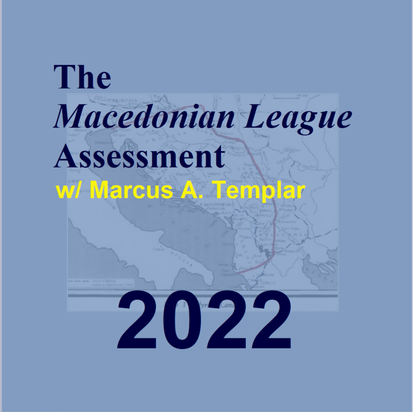

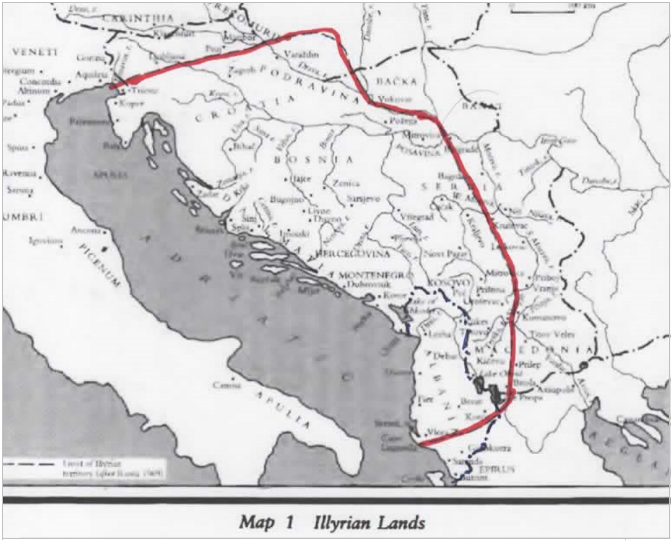

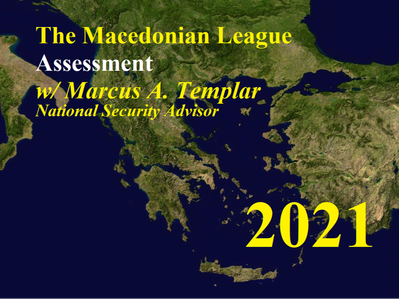






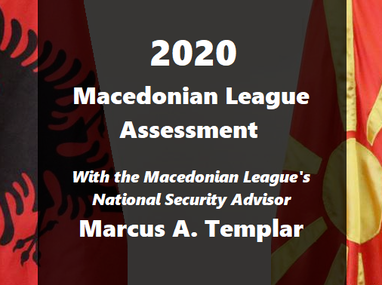
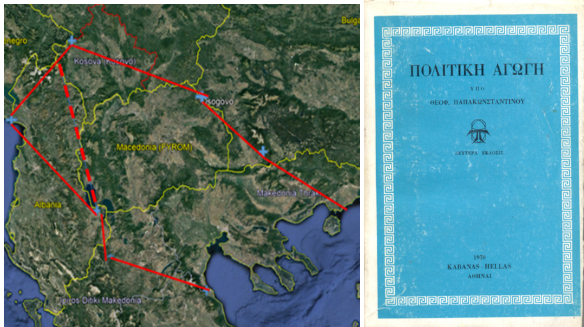
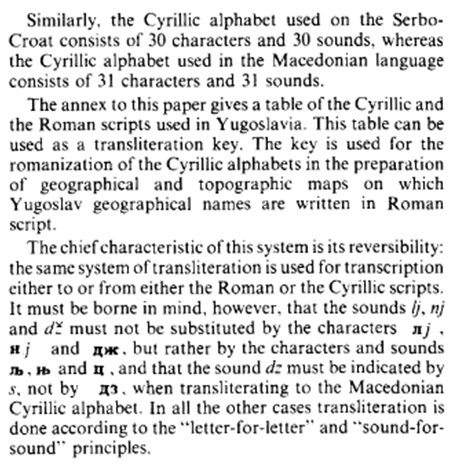
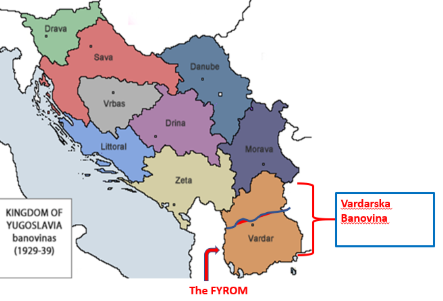
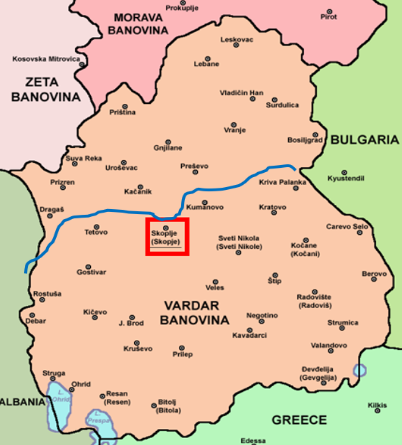
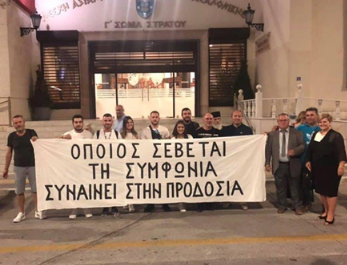
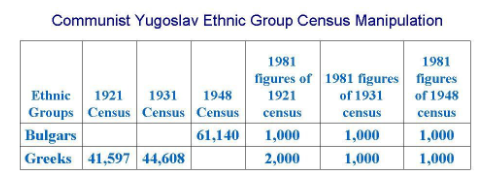
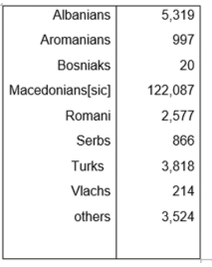

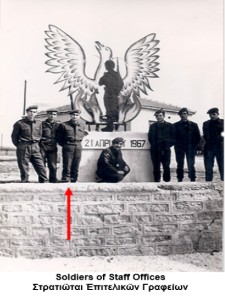
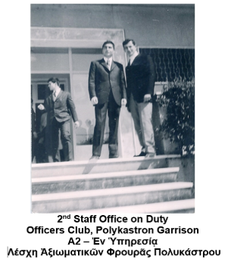

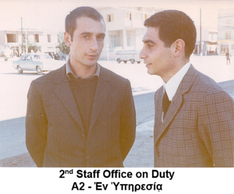
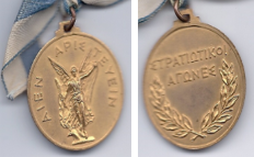
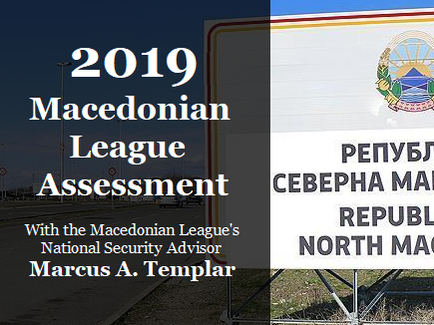
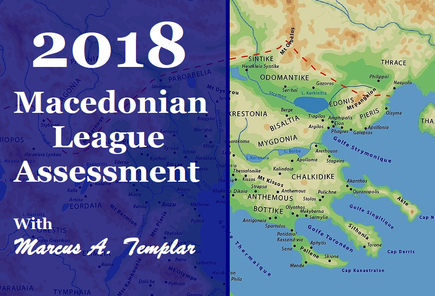




 RSS Feed
RSS Feed